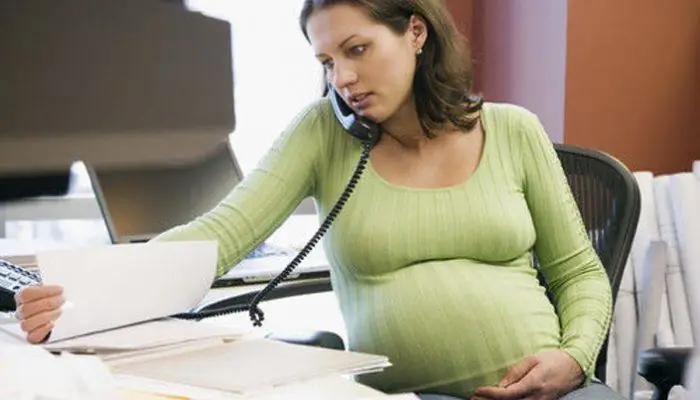2026 Author: Priscilla Miln | miln@babymagazinclub.com. Last modified: 2025-01-22 17:55:13
Children of preschool and school age are more prone to anxiety, which sometimes occurs for no apparent reason. Diagnosing it is quite simple due to a set of characteristic signs, but eliminating fears can be a difficult task. An anxious child reacts poorly to stimuli, communicates poorly. The quality of life of these children is declining.
Why does it occur?
The main causes of anxiety in a child under the age of 6 are difficult relationships with parents. This is especially true for boys. The degree of anxiety in parents is largely reflected in the similar condition of the child. The use of an authoritarian parenting style, excessive demands on the baby or comparing it with others significantly increases anxiety. Often, anxiety occurs as a result of neuroses and other mental disorders.

Among the main reasons for thisstates include:
- lack of feeling of safety in the child;
- repulsion of the baby by adults, their hostility;
- adverse family environment;
- poor financial opportunities of the family;
- discrepancy between the requirements of parents and the real possibilities of the child;
- Inadequate claims of adults to the baby;
- inflated parental anxiety;
- adults making conflicting demands;
- parents fail to be consistent in raising a child;
- authoritarian parenting;
- excessive emotionality of parents;
- constant comparison of the child with peers;
- the desire of parents to meet generally accepted standards.
Types and types of anxiety
If changes in behavior are noticed, especially if the child is anxious, the recommendation of experts is to seek advice from a doctor. Treatment will depend on several factors.

There are two types of anxiety:
- Anxiety as an established character. In this case, the features of personal temperament play a role, copying the behavior of unbalanced adults.
- Situational anxiety. It is usually caused by individual events.
Anxiety children are divided into several types:
- Neurotics. An increased degree of anxiety in such children leads to somatic disorders, namely, tics,stuttering, uncontrolled urination.
- Disinhibited children. This type of childhood anxiety is expressed in the form of increased activity and excessive emotionality.
- A shy kid who is afraid of almost everything.
- Closed children. This type is characterized by coldness, lack of responsiveness, increased alertness of the baby.
How to tell if a child is anxious?
In general, this condition is not a diagnosis. The specialist, most likely, will not prescribe treatment until the situation escalates. However, if no action is taken, the consequences can be dire.

If parents notice that the child is anxious, cannot concentrate, needs parental protection, it is advisable to consult a doctor for recommendations.
How to determine that this is not just situational nervousness, fear, but a serious problem requiring intervention?
There are several clear signs of an anxious child:
- Hysterical behavior when parting with loved ones. At first, it may seem that the baby reacts painfully exclusively to parting with his mother, but this is not so. An anxious child has a hard time being separated from any person he knows. A clear example of this behavior is attending a kindergarten in the first stage.
- The child constantly clings to one of the parents and reacts sharply to attempts to separate him. At first glance, this is normal, because this is how children feelyourself protected. But there is also a downside. Without physical contact with a loved one, the baby develops a feeling of anxiety.
- Refusing to go to an educational institution. Some parents think it's because the kids just don't like learning, the staff, or the routine at school or daycare. But the reason may be anxiety, which, by the way, greatly slows down the learning process.
- Sleep disorders, which are expressed by different symptoms. The child has nightmares, he cannot sleep for a long time. In advanced cases, the baby has urinary incontinence. Most often, the reasons lie precisely in the psycho-emotional state, which requires immediate intervention.
- Crying even over small things. In such cases, it is strictly forbidden to call the child a crybaby or other offensive words. The point here is increased anxiety, and threats and humiliation cannot eliminate the problem.
- Psychosomatic reasons. In some cases, these symptoms are a sign of a child's anxiety. It can be pain in the abdomen, lack of air, loss of consciousness and more. They are most pronounced when they are near the object of alarm.
The severity is determined by the number and intensity of manifestations. If occasionally only one of the listed signs appears, there are no serious concerns, and with the support of the family, the child will cope with anxiety on his own. If the concern is manifested by several symptoms, they are intense and prolonged, the intervention of a specialist is necessary.
Why is this condition dangerous in children?

An anxious child may develop the following problems:
- Deterioration of academic performance. It is worth noting that some children, on the contrary, begin to study better, fearing the anger or punishment of their parents.
- Social exclusion. It is expressed by the fact that the child withdraws into himself and ceases to communicate with peers and people around him, with the exception of his parents. In the future, he may not learn to communicate, he will not learn basic social skills, he will become an outcast.
- Every new person in the environment, a conversation with a stranger causes anxiety in the child.
- Fear of making a mistake. This is a serious problem, which over time will be reflected not only in the child's indecision when taking a responsible step, but even in small things. He, most likely, will get used to always and in everything retreat, will grow indecisive. If for girls such a character trait is forgivable, then the young man will face many problems in life.
- Inadequate behavior. Anxious children, growing up, often become so-called freaks. Even outgrowing childhood fears, they strive to stand out in any way or, conversely, move away from society.
How does the condition manifest in preschool?
Permanent anxiety can develop in a child at any stage of life. Anxious preschool children are a large group that needs mandatory intervention from a specialist in the early stages.
So, in babies aged one to three yearsoften have nightmares. At two years old, the child reacts sharply to unexpected sounds, experiences fear of loneliness and pain, for example, violently and continuously reacts to medical workers.
From the age of three to five, children are massively exposed to the fear of the dark, confined spaces or loneliness. One of the main causes of panic in children aged five to seven years is the fear of death.
Characterization of an anxious primary school child
A child's body that is not strengthened and not tuned in to intensive training often cannot withstand the load, the baby gets sick. And the desire to study disappears altogether, while anxiety from thoughts about upcoming studies is growing rapidly.
Anxiety in children of primary preschool age is observed in the second month after the start of education. That is why they need a short week's rest. The development of a sense of anxiety in younger students often arises from parents or a teacher. In families with a friendly and calm atmosphere, children are less restless, unlike those where conflict situations constantly arise.
According to psychologists, in preschool and primary school age, boys suffer more from anxiety, girls tend to do this after 12 years. At the same time, the former are more worried about punishment and violence, while the latter are worried about relationships with others.
Organizing the lives of anxious children
For these guys, adherence to the regime is of great importance. They are not very fond of hygiene procedures, so it is important that bathing in the bathgave them pleasure. Let it be foam, toys, that is, what they like. With wellness procedures and the development of swimming, it is better to wait a little. Anxious children do not like to change clothes, so it is better for them to buy comfortable clothes that are easy to put on and take off.

Guys with anxiety syndrome are difficult to feed, so don't cook multi-ingredient meals for them, keep it simple and he althy.
It is difficult for an anxious child to interact in a team, so it is necessary for him to create conditions under which he can be among children. The baby should not be forced, it should be gently guided.
Sometimes it is very difficult for parents to find a common language with their child, but if you are sensitive to his feelings and requests, establish a warm relationship, then over time he will begin to change for the better.
Advice for parents of anxious children
Experts advise taking into account the following recommendations:
- Don't make excessive demands on your child.
- Show your love for your baby as often as possible.
- Praise your child in public.
- Don't use words that degrade children.
- Criticize less.
- Don't force to apologize, but ask for an explanation of the misconduct.
- Spend more time together.
- Hug and hold your baby's hand more often.
- Take an interest in the life of the baby, his opinions and feelings.
- Be unanimous and consistent in educationchildren.
- Offer to help your child, but don't solve all the problems for him.
- Share your childhood fears and difficult situations.
Increase self-esteem
The work of a psychologist with an anxious child includes three components:
- Increasing self-esteem of the child.
- Developing skills to manage your emotional state.
- Exercise to reduce muscle tone.
It is quite natural that it is impossible to quickly raise a child's self-esteem. It is important to carry out appropriate activities on a daily basis. Address the baby by name, praise for the slightest achievements in private and in the presence of other children. At the same time, approval must be sincere, since every child feels and reacts painfully to falsehood. Be sure to say what he is encouraged for.
Let's consider the rest of the elements in more detail.
Self-management skills
It is extremely rare for a child to share his experiences and fears, so it is necessary to instill in him self-management skills:
- Make stories together.
- Talk about situations that worry your baby.
- Don't compare your child to other children.
- Don't force me to participate in any competition.
- Ask about the causes of your child's restless behavior.
- Establish confidential communication.
Decreased muscle tone
Relaxing exercises are extremely useful for restless guys. The list of recommendations for parents of anxious children includes massage sessions, yoga, respiratorygymnastics.
A great way to relieve increased anxiety in a child is to paint the face with unnecessary lipsticks or special paints. You can arrange a kind of masquerade or dress-up show. To do this, together with the children they make masks, costumes and other accessories. Such an impromptu performance will relax the baby and bring a lot of pleasure.
Anxiety Prevention
If parents want their child to grow up balanced, first of all, it is necessary to create a favorable psychological environment in the family, conducive to harmonious personal development. If from an early age to establish a trusting relationship with the baby, then the development of anxiety in him can be avoided.

Correctional work with anxious children, as well as preventive measures, include discussion of emerging problems in the child, close communication, joint pastime, walks, picnics and more. Parents and kids are brought together by a relaxed atmosphere, joint creativity that allows you to relax.
How to play with worried children?

When starting classes with an anxious child, you must adhere to the following rules:
- The new game is introduced gradually, first explaining its rules. Then they visually show how other children play it. A child is only attracted if he wants to become a member.
- It is recommended to avoid the competitive component of contests.
- Introducing a new game, one shouldremember that the child should not feel the danger of meeting with the unknown. It is desirable to carry out training on already familiar material. You can partially use the rules of a game already well mastered earlier.
- Blindfolded classes are introduced only after careful preparatory work and with the consent of the baby.
Comprehensive behavior correction, attentive attitude of loved ones, a welcoming atmosphere in the family - all this will achieve positive dynamics and raise a child who is self-confident.
Recommended:
Wife does not want to work - what to do? How to persuade your wife to work: advice from a psychologist

Every second man faces a problem when his wife does not want to work. What to do in such a situation, to force the missus not to be lazy and find her place in life, or to let her stay at home and raise children? The solution to the problem is quite obvious when the family does not have enough money. But when a man earns well, the question can hang open for many years. Find the answer below
Angina in a child of 2 years. What to do with angina? Signs of angina in a child

Angina is an acute infectious disease associated with inflammation of the palatine tonsils in the mouth. The causative agents of angina are various microorganisms, such as streptococci, pneumococci, staphylococci, adenoviruses and others. Favorable conditions for their successful reproduction, which provokes inflammation, include hypothermia of the child, various viral infections, inadequate or poor-quality nutrition, and overwork. What is angina in a child of 2 years?
An ill-bred child: signs, causes. How to raise a child?

Who is an ill-mannered child? Useful and actionable tips on how to raise a happy child in the modern world
Watch "Luch": reviews of the owners, types, a large selection of models, characteristics, features of work and care

Are wristwatches necessary in the 21st century? Almost everyone has a mobile device that can not only show the time, but also update it on the Internet. However, removing the smartphone from a bag or pocket makes the task a little more difficult and does not allow you to track the time frame at a high speed. Without letting go of the phone, it is difficult to go in for sports, make purchases, fully work and relax. If a person owns a Luch wristwatch, just one movement allows you to find out the time
When to talk about pregnancy at work? When should I bring my pregnancy certificate to work? What does the Labor Code provide for pregnant women

Despite the fact that pregnancy is a purely personal matter for a woman, it worries not only her, but also the employer. After all, an employee in a position means frequent requests, sick leave and, of course, in the end - maternity leave. About when to talk about pregnancy at work and how to do it right, we will tell in the article below

